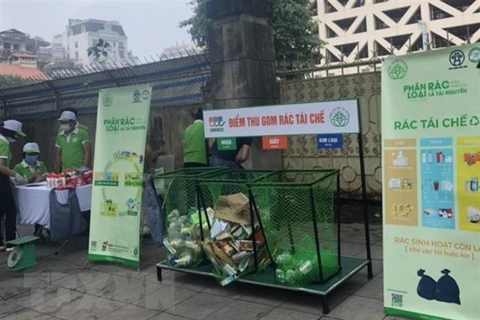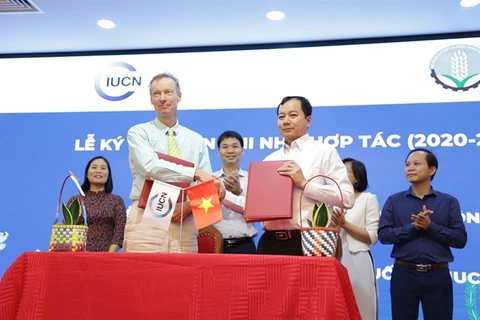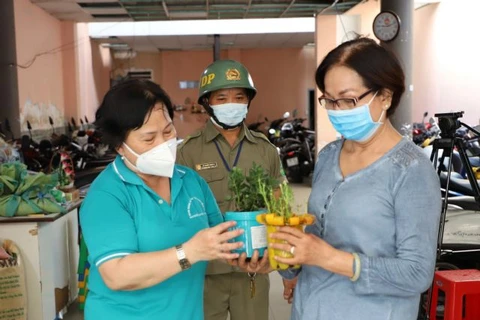HCM City (VNS/VNA) - More companies in Vietnam are carrying out programmes to reduce waste and achieve sustainable, environmentally-friendly operations.
The campaign “Go Green” from TikiNOW Smart Logistics, for example, has contributed to sustainable and eco-friendly operations after one year of implementation.
In September last year, TikiNOW Smart Logistics (TNSL), Tiki’s logistics entity, kicked off “Go Green", which focuses on two key approaches: replacement and reduction.
The first step is to replace non-compostable plastic packaging materials with eco-friendly ones with a much shorter decomposition time. Specifically, bubble wraps, commonly used to protect fragile items but need 100 years to completely decompose, are now replaced with carton papers, which need only two months for decomposition.
Foams that hold products in place and take as long as one million years to decompose are replaced with thick papers. Bulky goods are covered with 2 to 3 layers of protective papers and with biodegradable plastic wraps to help minimise damages from impacts during transportation.
Together with replacement, reduction is also applied as another major approach in TNSL’s green operations chain.
Before the campaign began, there were 16 kinds of packaging boxes with different sizes at Tiki warehouses. The box sizes, however, did not fit the items’ actual sizes. This resulted in items being packed in much larger boxes, which required extra amounts of material such as foam or plastic during transportation.
Henry Low, CEO of TNSL, said: “This not only requires much more packaging material than actual demand, but also causes excess air in transportation, which leads to neither environmentally friendly nor efficient operations.”
Since the "Go Green" campaign was launched, TNSL has optimised packaging box sizes at all fulfilment centres. All products before being warehoused are scanned for size measurement and storage by Cubiscan machines.
When packing, warehouse workers scan the code of a single product or of all the products in one order, and the system recommends the most suitable box size. This not only cuts down packaging time but also saves a large portion of other extra materials. The size and weight of transport are also better optimized.
The number of box sizes at TNSL warehouses has been reduced to nine types. And 85 per cent of packaging materials at TNSL are now eco-friendly. The proportion of packaging materials in use has also halved, which has led to a decline in cost of 50 per cent.
In order to accomplish these results and progress to further improvement in the coming time, commitment by all staff and management is essential. Human resource training is considered a key factor in the success of the campaign. Personnel at the TNSL Fulfillment Center are equipped with knowledge about limiting plastic waste and practical skills that align with the new packaging standards.
Low said: "Conducting this campaign is not about catching temporary trends, but is about our long-term strategy in building and developing a sustainable and responsible supply chain.”
Another company pursuing waste reduction is Coca-Cola Beverages Vietnam Limited, which wants to have all of its packaging to be recyclable by 2025, and to have at least 50 per cent recycled material used in its packaging by 2030.
The company has also launched a programme to remove plastic shrink film on Dasani bottled water, and aims to collect and recycle a bottle or can for each one sold by 2030.
The company said these actions reflect its commitment to its long-term strategy for managing plastic waste, as part of Coca-Cola’s global strategy called “World Without Waste”.
Coca-Cola is co-operating with the Vietnam Business Council for Sustainable Development, Vietnam Chamber of Commerce & Industry, Unilever and Dow to carry out a "Zero Waste to Nature" programme which promotes a circular economy and raises public awareness, seeks effective recycling technology, and builds new habits of responsible waste management in society.
Coca-Cola Vietnam is one of the founding members of the Packaging Recycling Organisation Vietnam (PRO Vietnam), which shares their goals, vision and responsibilities in promoting a circular economy in Vietnam through activities of reducing, sorting, collecting and recycling waste.
PRO Vietnam
PRO Vietnam is a coalition of leading FDI and Vietnamese companies with high prestige, diverse experiences and especially an earnest responsibility to Vietnamese consumers and to the environment. This includes the consumer goods and packaging industries, united in a vision to work with the Government in providing a long-term impetus to packaging and recycling in the country, making Vietnam green, clean and beautiful.
According to PRO Vietnam, rapid urbanisation and consumerism combined with the lack of an anti-litter culture and absence of recycling mindset among the population is building up to a large-scale litter and ecological problem in Vietnam.
Most of Vietnam’s mismanaged packaging waste is ending up in landfills and spoiling the country’s long coastline, according to PRO Vietnam.
Vietnam ranks among the top four countries with the largest volume of mismanaged plastic waste in the world. A huge portion of inorganic waste in Vietnam is packaging, which does not get treated properly.
PRO Vietnam is supporting the Government in the “Recycle” aspect of the 3Rs (Reduce – Reuse – Recycle).
The focus of PRO Vietnam is to build partnerships between local governments and stakeholders in the value chain for packaging in order to increase recycling.
PRO Vietnam is focused on incentivising the recycling industry to increase packaging collections via the informal and formal sectors, in addition to education and awareness to drive behaviour change by promoting the circular economy for packaging.
PRO Vietnam aims to collaborate with the recycling business, driving a circular economy of packaging in Vietnam by 2030. This model will recreate an entire ecosystem of consumer good packages, from design and manufacture to collection after usage, recycling and reuse, giving a second life to packaging waste.
URC, a leading food and beverage manufacturer in Vietnam, was a founding member of PRO Vietnam. As part of the group's strategy outlined last year, it wants PRO Vietnam to contribute to a green, clean and beautiful Vietnam by promoting a circular economy model through the product packaging and recycling process.
Laurent Levan, president and general director of URC Vietnam, said on the Pro Vietnam website: “We understand that packaging can bring convenience as well as guarantee food hygiene, but it also creates a burden of waste if not handled properly."
Acknowledging its responsibility in the plastic waste crisis, Levan said that PRO Vietnam "wants to join hands with the community to become part of the solution".
Maintaining sustainable development and accompanying the community to adapt to climate change and prevent pollution are not only the company's responsibility to society, but also offer competitive advantages that help URC build a resilient value chain and closer relationships with consumers, the company said./.
VNA























